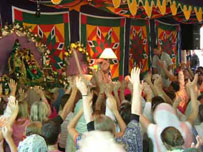May 19, 2004: Badger, California (Part 2)
Tridandisvami Sri Srimad Bhaktivedanta Narayana Gosvami Maharaja
[In Badger, California, from May 19-24, 2004, Srila Gurudeva gave a series of talks from Srila Sanatana Gosvami's Brhat-Bhagavatamrta. Listen. Here Sri Srimad Bhaktivedanta Narayana Gosvami Maharaja explains the magic-like effects of mahat-sanga, the association and mercy of great souls. Because Sri Guru is eternally with us, eternally offering his sublime association, we pray that this lecture will serve to bring the respected reader increased connection with his lotus feet.]
tac chraddadhana munayo
jnana-vairagya-yuktaya
pasyanty atmani catmanam
bhaktya sruta-grhitaya
["The seriously inquisitive student or sage, well equipped with knowledge and detachment, realizes that Absolute Truth by rendering devotional service in terms of what he has heard from the Vedanta-sruti." (SB 1.2.12)]
Srila Suta Gosvami was a disciple of both Srila Sukadeva Gosvami and Sri Baladeva Prabhu. He was a realized person and knew all tattva. In spite of this, however, he did not tell his audience, "I am tattva-vida." He does not say, "I, myself, am one of those who are in full knowledge of the established transcendental truths. He is not taking the credit.
We should learn from his excellent example. It is not right to think that we are knowers of what we have learned. One who thinks like this is not a Guru, but rather a "kan-guru." What you have learned from your Gurudeva and from learned Vaisnavas is their credit. Don't be proud thinking, "I know more than anyone." Sri Suta Gosvami has set the example here in this verse. He is very humbly saying, "vadanti tat tattva-vidas." Those who know are great personalities like Lord Brahma, Sri Narada, Sri Parasara Muni, and Srila Vyasadeva himself is maha-muni - and Srila Sukadeva Gosvami knows still more than Him. There are so many - thousands upon thousands are there. 'Tac chraddadhana munayo'. Those who meditate on the Absolute Truth are munis.
If one thinks he has bhakti, but he has no jnana (knowledge), and no vairagya (renunciation), his so-called bhakti is bogus. It is absurd to think that bhakti can be present without tattva- jnana and vairagya. Both jnana and vairagya are like sons of bhakti They are part of bhakti. Without bhakti they have no true existence.
Pasyanty atmani catmanam bhaktya sruta-grhitaya means those who have served their Gurudeva and heard from him in a proper way. What is the proper way? In the Bhagavad-gita it has been said:
tad viddhi pranipatena
pariprasnena sevaya
upadeksyanti te jnanam
jnaninas tattva-darsinah
["Just try to learn the truth by approaching a spiritual master. Inquire from him submissively and render service unto him. The self-realized souls can impart knowledge unto you because they have seen the truth." (Bhagavad-gita 4.34)]
This is the proper line. Those who do not serve their Gurudeva, but at the same time can remember all these verses and tattvas, do so in vain. On the other hand, if any disciple is always serving, washing the clothes of his Gurudeva, cooking for him, etc., he has the right to hear, and his hearing will have some value. Otherwise there is no value. Those who do no service and have no sraddha (strong faith) cannot properly hear.
Jnana-vairagya-yuktaya means that the munis and rsis are telling this - the tattva-vidas are telling this. They are "pasyanti". Pasyanti means they actually realize or see their own souls as well as the Supreme Soul. In the Supersoul they see all living entities, and in all living entities they see the Supersoul. For example, Sri Prahlada Maharaja sees Sri Krsna, and what does he see in Sri Krsna? He sees the existence of the entire universe. Such great souls are called maha-bhagavatas. Srila Suta Gosvami is speaking about the maha-bhagavatas - those who are really serving.
What is the meaning of service? Guru mano-'bhistam sthapitam yena bhu-tale - those who know the desire of their Gurudeva. For example, Srila Rupa Gosvami knew the desire of Sri Caitanya Mahaprabhu, and he established that desire in this world through his many books. A disciple will surely do that. Even he has not studied the Vedas or other scriptures, he can still do this by the special mercy of Sri Gurudeva; and there are thousands upon thousands of examples of this.
There is the very "near" example, in the lives of Srila Bhaktisiddhanta Sarasvati Prabhupada and Srila Gaura Kisora dasa Babaji Maharaja. Srila Gaura Kisora dasa Babaji was not literate in the eyes of the world, but Srila Prabhupada, the greatest scholar of his time, selected him as his Guru. Srila Gaura Kisora dasa Babaji Maharaja rejected his plea to become his disciple however, saying, "I will ask Sriman Mahaprabhu, and if He will reply, then I will give you initiation." For so many days he told him, "Oh, I forgot to ask." Then, one day Srila Bhaktivinoda Thakura, the father of Srila Bhaktisiddhanta Sarasvati Thakura, told Babaji Maharaja: "Do you want my son to die? Why do you not initiate him?" He replied, "Oh, I have asked, but the reply has not come and I forget to ask again." In this way he at first appeared to reject such a qualified person as Srila Prabhupada, just to show the humility and sincerity of his disciple. So you can imagine how exalted he was. He was blind, and he was illiterate, but he was situated on the head of all literates.
Also, there was once a murderer named Valmiki. He hunted and killed so many brahmanas, rsis and maharsis. By his good fortune, he met Sri Narada Rsi one day, and simply by Narada Rsi's touch he became like gold. Narada Rsi was like a touchstone, and by his touch that hunter became like him. That hunter became a realized rsi. Narada Rsi had told him to chant, "Rama, Rama, Rama, Rama" but he could not do so. So Narada then asked him, "Can you chant, "Mara mara mara." Mara means "death". Valmiki replied, "Oh yes," and he began, "Mara mara marama rama rama..." Mara eventually turned into Rama. There was no need of his studying in gurukula. Nothing was required for him. By Sri Narada's association he indirectly began, and then directly began, chanting "Rama Ram Rama"; and he became self-realized.
Sruta-grhitaya. First serve, then hear from Sri Gurudeva and Srimad-Bhagavatam, and then realize. Gradually you should come to this point.
srnvatam sva-kathah krsnah
punya-sravana-kirtanah
hrdy antah stho hy abhadrani
vidhunoti suhrt satam
["Sri Krsna, the Personality of Godhead, who is the Paramatma [Supersoul] in everyone's heart and the benefactor of the truthful devotee, cleanses the desire for material enjoyment from the heart of the devotee who has developed the urge to hear His messages, which are in themselves virtuous when properly heard and chanted." (SB 1.2.17)]
nasta-prayesv abhadresu
nityam bhagavata-sevaya
bhagavaty uttama-sloke
bhaktir bhavati naisthiki
["By regular attendance in classes on the Bhagavatam and by rendering of service to the pure devotee, all that is troublesome to the heart is almost completely destroyed, and loving service unto the Personality of Godhead, who is praised with transcendental songs, is established as an irrevocable fact." (SB 1.2.18)]
"Nasta-prayesv abhadresu nityam bhagavata-sevaya" means those who have removed their abhadra (anarthas), unwanted habits." Such a devotee is serving Gurudeva and hearing hari-katha. Only a small amount of anarthas remain at this stage, and this stage is called nistha. Anisthita (unsteady) bhakti has gone.
What is the meaning of "bhagavata-sevaya"?
There are two kinds of bhagavatas. One is called grantha-bhagavata and the other is bhakta-bhagavata, or bhakti-rasa-patra - exalted devotees, who are the reservoirs of the mellow of pure devotion. Srimad-Bhagavatam is one type of bhagavata and Srila Sukadeva Gosvami, Sri Narada Gosvami, and Srila Suta Gosvami are the other kind of bhagavata.
By serving these two kinds of bhagavatas, naisthiki-bhakti (steady devotion) will come. Ruci (pure love of God) comes after naisthiki-bhakti, and then asakti, (attachment to Sri Radha-Krsna) comes. Then rati (transcendental emotion) comes, and after rati, prema (pure love of God) manifests. If one wants transcendental bhakti but does not want to serve Guru and Vaisnavas, nothing will be accomplished.
In Brhad-Bhagavatamrta, 2.7.14, Srila Sanatana Gosvami has written:
mahat-sangama-mahatmyam
evaitat paramadbhutam
krtartho yena vipro 'sau
sadyo 'bhut tat-svarupavat
"The glory of mahat-sanga is super-astounding. By the influence of that glory, Jana Sarma's life immediately became successful, like that of his Guru, Svarupa. He became a personal friend of Sri Krsna by the association of Svarupa, who was known as Gopa Kumara in this world. That he immediately attained bhagavat-prema demonstrated the immense value of association with a great personality. Just like Svarupa, within an instance that brahmana felt fully gratified."
[Srila Narayana Maharaja:] There was once a Mathura brahmana, and he had many desires. He went to Prayaga, Jyotispura one day, and there he came in contact with the power of Sankara, Kamakya-devi, who is a parama-vaisnavi. He served her there, and one day, by her mercy, she gave him the Gopal-mantra in a dream. She appeared in his dream and he accepted that mantra from her. He did not receive from her the full process of how to chant, but he received something of it. When Guru gives a spiritual mantra he also gives the process by which to chant it. For example, he says, "You should chant ten times in the morning, ten times in midday, ten times in evening, and meditate in such and such a way." So she instructed him in the initial process, and by following her instructions, his desire for wealth, position, and so on disappeared.
After awhile he left that place and, traveling from place to place, eventually arrived in Bhauma-Vrndavana and met Sri Gopa Kumara. He accepted Gopa Kumara as his Guru, and, in order to increase Jana Sarma's faith in bhakti and bhakta, Gopa Kumara told him his own story. He explained that he was a gopa of Govardhana, where he had met his own spiritual master and received Gopal-mantra from him. He told Jana Sarma how his own spiritual journey had taken him from there to Kasi, Prayaga, Indraloka in Svarga (Heaven), then to Brahmaloka, and then to Vaikuntha.
From there he had gone to Ayodhya, then to transcendental Dvaraka and Mathura, and then back to Bhauma-Vrndavana - and wherever he went he was not truly happy. He told Jana Sarma that when he was in the upper planetary system, all the rsis there began to tell him: "You should remain here and meditate; you are Brahma (that one, impersonal God.)" Then he went to Vaikuntha-loka, where all the residents told him, "You should remain here and look like Lord Narayana - four-handed and with all opulences." However, because he was continually chanting his Gopal-mantra, he could not be happy there. On the suggestion of Sri Narada Rsi he went to Ayodhya. Rama even dressed like a cowherd boy, to satisfy him, but he was not satisfied. Then he was sent to Dvaraka. There he became like a Yadava, and Dvarakadhisa Krsna also dressed up as a cowherd boy, but he was also chanting and remembering his mantra there; so he was not happy.
He then returned to Vrndavana - Bhauma-Vrndavana - and from there he went to Goloka Vrndavana and became fully satisfied by entering into sakhya-rasa with Vrajendra-nandana Syamasundara. There, as a cowherd boy, his name became Svarupa. Srimati Radhika personally sent Svarupa back to Bhauma-Vrndavana to deliver Jana Sarma.
Gopa-kumara told Jana Sarma his own history, and also explained the different rasas. He told him all spiritual truths, from top to bottom. Still, Jana Sarma could not realize anything. Then, Svarupa placed his hand on his head, saying, "Now you will realize all the spiritual truths you heard." And Jana Sarma immediately went to Goloka-Vrndavana and met Krsna.
By the mercy of his Gurudeva named Svarupa, Jana Sarma became like Svarupa, of sakhya-rasa, and he also began serving as a cowherd boy in Vrndavana.
So guru-mahatma is so powerful.
mahat-sangama-mahatmyam
evaitat paramadbhutam
krtartho yena vipro 'sau
sadyo 'bhut tat-svarupavat
If Narada will come and tell the hunter, Valmiki, "At once you should realize Rama and his abode and pastimes", that very thing will transpire. If Srila Rupa Gosvami will come and place his hand on someone's head, that person will also become realized. When Sri Svarupa Damodara placed his hands on the head of Srila Raghunatha dasa Gosvami, he became like Sri Svarupa Damodara. The glory of Sri Gurudeva - if he is really advanced and self-realized, is unlimited. We cannot glorify him properly.
Even if one is not on that advanced level, but he is sincere - even if he is madhyama-adhikari, we can learn so many things from him. We can realize up to the stage on which that Vaisnava is situated.
Don't disbelieve these astounding truths. Try to serve Gurudeva purely. Even if you do not know any tattva, but you are serving him in various ways, one day he will place his hands on your head, saying, "Oh, you should be successful. Your life should be successful."
[Devotees sing "Hari Hari, Kabe Mora Ha'be Hena Dina" by Srila Bhaktivinoda Thakura:]
"O Hari! O Mahaprabhu! When will the fortunate day come when rati, deep love and attachment, will come in my heart for the lotus feet of the pure-hearted Vaisnavas? (At that time I will honor and serve them, and thus all my material desires and anarthas, especially lust and anger, will go." (Verse 1)
"(With a heart free from duplicity) my outer behavior will correspond t my inner feelings and thoughts. (Seeing myself as completely insignificant) I will give all respect to others, seeking no honor in return. Always dancing and singing the holy names, I will remain constantly absorbed in remembering Sri Krsna's beautiful pastimes." (Verse 2)
"My bodily maintenance should simply go on by habit so that my mind can be fully given to harinama. I will become attached only to that which is favorable for serving Sri Krsna." (Verse 3)
"I will firmly reject whatever is unfavorable for His service. Continuing to do bhajana, in time I will give up this body (happily and peacefully)." (Verse 4)
"Residing alone in the forest of Godruma and continuously weeping, Bhaktivinoda anxiously prays, 'I am living only with the hope that Mahaprabhu will bestow His mercy on me.' " (Verse 5)
Transcriber: Janaki dasi
Typist: Vasanti dasi
Editor: Syamarani dasi









